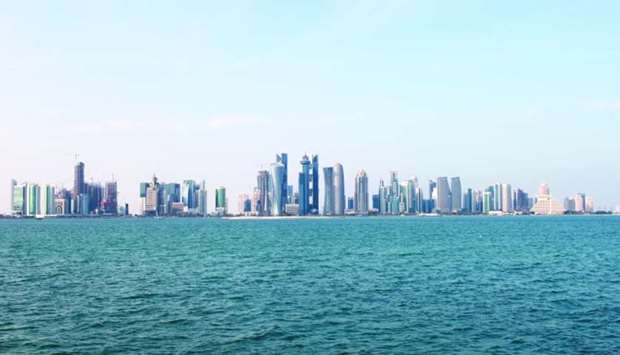A sharp expansion in new contracts and robust output expectations have helped boost sentiments in Qatar's non-hydrocarbon private sector in March this year, according to the Qatar Financial Center (QFC).
The uptick in business activity helped lift the headline PMI (Purchasing Managers Index) figure for Qatar from February's 48.5 to 50.1 in March. This improvement was reflected in new orders, higher output, lower stocks of purchases and suppliers' tighter delivery times (the latter index is inverted for the PMI calculation).
The PMI survey, which is compiled for the QFC by IHS Markit, provides an early indication of operating conditions in Qatar. The PMI readings of above 50 signal an improvement in business conditions on the previous month, while readings below it show a tightening.
“Intakes of new business boosted Qatar’s non-hydrocarbon private sector in March, with this indicator from the PMI survey at a seven-month high. Moreover, the month-on-month rise in the new business index, at 4.5 points, was the second-largest in nearly a year-and-a-half," said Sheikha Alanoud bint Hamad al-Thani, managing director (Business Development), QFC Authority.
This improvement in demand, according to her, influenced companies’ expectations for total workloads, with the future activity index rising to the second-highest level since the survey began in April 2017.
Over the first quarter of 2019, Qatar’s PMI has trended higher compared with the final quarter of 2018 — a period during which the global economy saw the softest expansion in over two years, she said.
Overall confidence was the second-highest on record, with concurring reports from survey respondents of new project launches, QFC said, adding stronger inflows of new work helped to boost expectations regarding the 12-month outlook for growth of total business activity, with 80% of surveyed companies expecting output at their units to rise by March 2020. As a result, the output index registered a three-month high.
The overall rise in the headline figure was slightly tempered by a weaker contribution from employment, which, however, had registered a record high earlier in the quarter.
As a whole, non-oil activity has resurged over the first quarter of 2019 with the PMI trending at 49.7, compared to the lower average recorded over the second half of 2018 (49.3).
As a consequence of substantially higher new business orders, there was evidence of rising pressure on business capacity with the indicator for backlogs of work at an eight-month high, it said.
The latest survey indicated an intensification of overall cost pressures faced by non-energy private sector firms with average input prices increasing at the fastest rate since March 2018.
This mainly reflected non-staff costs — including shipping and customs charges, electricity and chemicals — as the indicator for wages and salaries indicated a slower increase in March, QFC said.
Finding that companies continued to cut their own prices charged for goods and services, it however said this pointed to further "pressure on operating margins".
The PMI survey, which is compiled for the QFC by IHS Markit, provides an early indication of operating conditions in Qatar. The PMI readings of above 50 signal an improvement in business conditions on the previous month, while readings below it show a tightening.
“Intakes of new business boosted Qatar’s non-hydrocarbon private sector in March, with this indicator from the PMI survey at a seven-month high. Moreover, the month-on-month rise in the new business index, at 4.5 points, was the second-largest in nearly a year-and-a-half," said Sheikha Alanoud bint Hamad al-Thani, managing director (Business Development), QFC Authority.
This improvement in demand, according to her, influenced companies’ expectations for total workloads, with the future activity index rising to the second-highest level since the survey began in April 2017.
Over the first quarter of 2019, Qatar’s PMI has trended higher compared with the final quarter of 2018 — a period during which the global economy saw the softest expansion in over two years, she said.
Overall confidence was the second-highest on record, with concurring reports from survey respondents of new project launches, QFC said, adding stronger inflows of new work helped to boost expectations regarding the 12-month outlook for growth of total business activity, with 80% of surveyed companies expecting output at their units to rise by March 2020. As a result, the output index registered a three-month high.
The overall rise in the headline figure was slightly tempered by a weaker contribution from employment, which, however, had registered a record high earlier in the quarter.
As a whole, non-oil activity has resurged over the first quarter of 2019 with the PMI trending at 49.7, compared to the lower average recorded over the second half of 2018 (49.3).
As a consequence of substantially higher new business orders, there was evidence of rising pressure on business capacity with the indicator for backlogs of work at an eight-month high, it said.
The latest survey indicated an intensification of overall cost pressures faced by non-energy private sector firms with average input prices increasing at the fastest rate since March 2018.
This mainly reflected non-staff costs — including shipping and customs charges, electricity and chemicals — as the indicator for wages and salaries indicated a slower increase in March, QFC said.
Finding that companies continued to cut their own prices charged for goods and services, it however said this pointed to further "pressure on operating margins".


